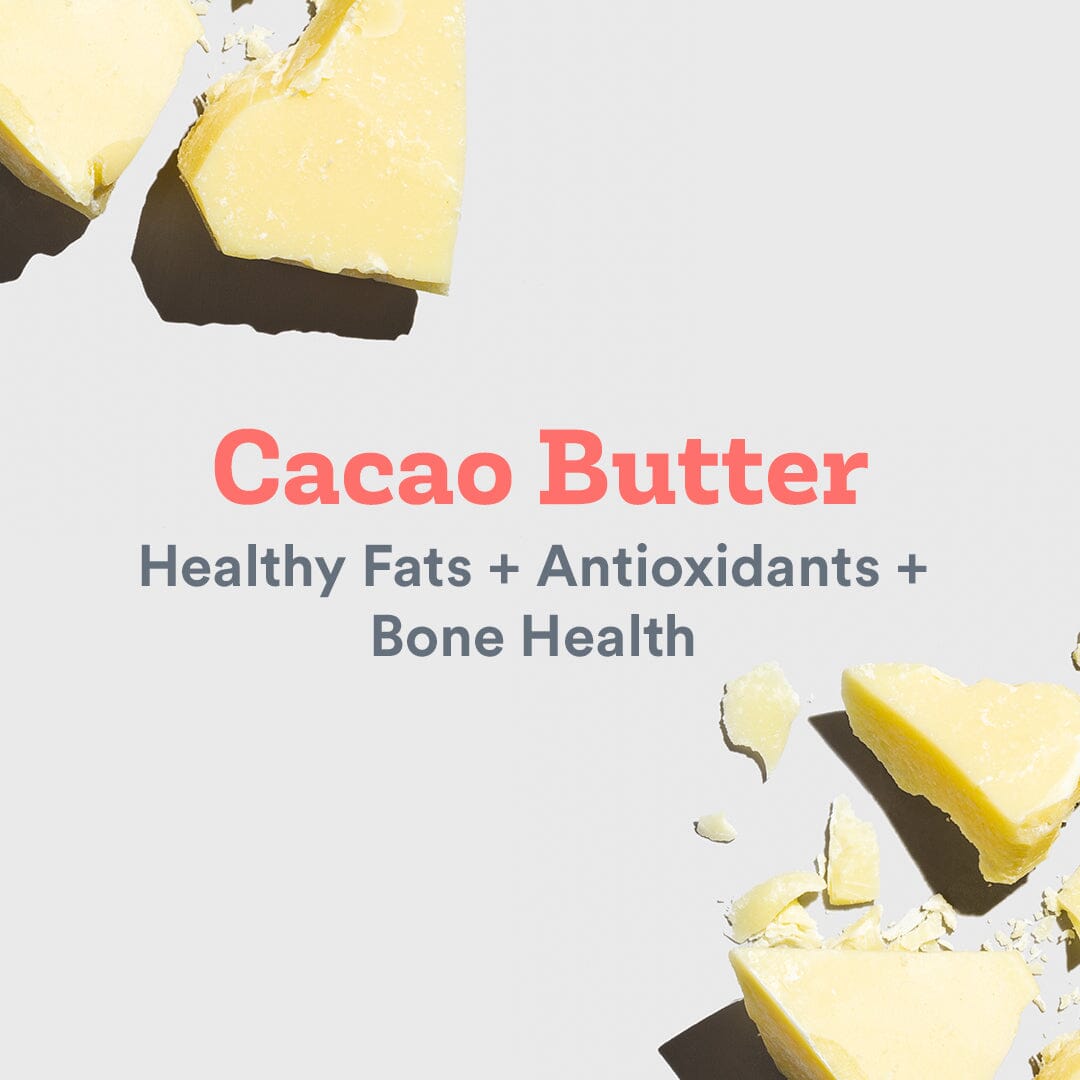
Scientific/Latin name: Theobroma cacoa seed butter
Also known as: Cocoa butter, theobroma oil
Native to: Amazon basin countries like Ecuador, Colombia and Venezuela
Parts used: Cacao butter is the fat extracted from roasted cacao beans
Top benefits: Source of healthy fats and Vitamins E & K

Cacao Butter. Add for creaminess and smoothness.
Despite the “butter” in the name, cacao butter has nothing to do with the dairy ingredient. Cacao butter is the fattiest part of the cacao bean - the seeds of the fruit (pods) of the Theobroma cacao tree - that is separated and removed from the bean. If separated using low heat, its nutritional content is preserved and the resulting butter is referred to as “raw cacao butter”, and if processed using higher heat, it’s referred to as “cocoa butter”.
Cacao butter is not a micronutrient-rich food, but it does contain a respectable amount of two fat-soluble vitamins: vitamin E, an antioxidant that protects cells from oxidative damage, and vitamin K1, known as the “blood clotting” vitamin, which is also involved in bone health.
Health Benefits of Cacao Butter
Healthy Fat
While the optimal level of consumption of different types of fats is a hotly debated topic, research has shown that from metabolism to brain function to cardiovascular health, fat is an essential macronutrient with powerful effects throughout the entire body. The reason for this is that the membrane structure of all of the cells in our body is significantly made up of fat, and specifically saturated fat. Without a sufficient amount of saturated fats, our cells would literally collapse, preventing nutrients from flowing in and out and causing the cells to die.
Cacao butter is white and rich in texture and in terms of its macronutrient profile, is 100% fat. It’s comprised primarily of saturated fat (approximately 60%) and monounsaturated fat (approximately 33%), and a small amount of polyunsaturated fat (approximately 3%, including omega-3 and omega-6 fats). Cacao butter’s saturated fat content is made up of 33% stearic acid, a longer chain (18 carbon) saturated fat, which has been found not to negatively impact blood cholesterol levels.

Vitamins E & K
As noted above, cacao butter contains two fat-soluble vitamins: vitamin E and vitamin K1. Vitamin E is an antioxidant that protects cells from oxidative damage, and is also important to vision, reproduction, as well as blood, brain and skin health. Vitamin K is most commonly known for its role in blood clotting. Additionally, because of its involvement in bone metabolism and regulating blood calcium levels, it is also essential for bone health (the effect of Vitamin K intake and levels on osteoporosis has been a focus of scientific research).
Fat-soluble vitamins must be consumed together with fat in order to be properly absorbed. While top sources of vitamin E include a number of oils and nuts, Vitamin K1 (phylloquinone), the main form of dietary vitamin K which comes from plants, is present primarily in green leafy vegetables. However, as a pure fat, Cacao Butter provides a complete vehicle for the absorption of these two vitamins.
The Dietary Reference Intake (DRI) of vitamin E for adults is 15 mg/day (Recommended Daily Allowance). 100 g of Cacao butter provides 1.8 mg of vitamin E, equal to 12% of the RDA. The DRI of vitamin K for adults is 100 µg/day for men and 90 µg/day for women. 100 g of Cacao butter provides 24.7 µg of vitamin k, equal to just under 30% of the DRI.
JOYÀ products that feature Cacao Butter
The health research presented in this article is for informational use only. It is not a replacement for professional health advice and should not be construed as a recommendation of specific products. The products sold on this website are not intended to diagnose, treat, cure, or prevent any disease. This information does not provide dosage or format recommendations or possible drug interactions, and accordingly, should be used with the advice of a qualified health care practitioner.

